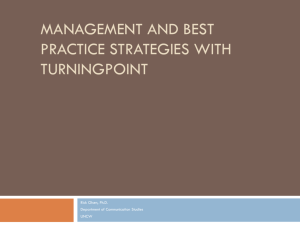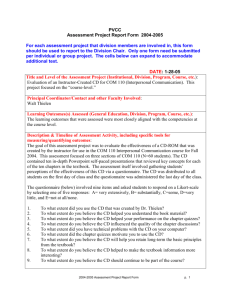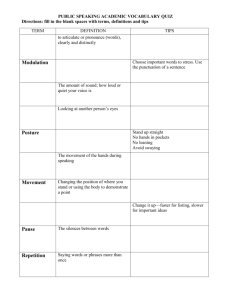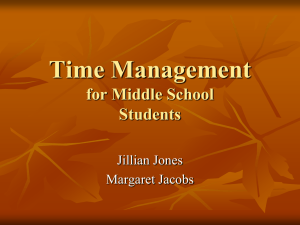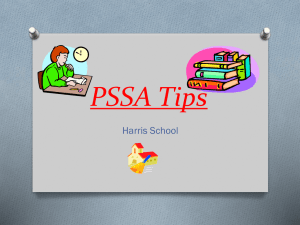you are teaching, but are they learning?: using clickers to promote
advertisement
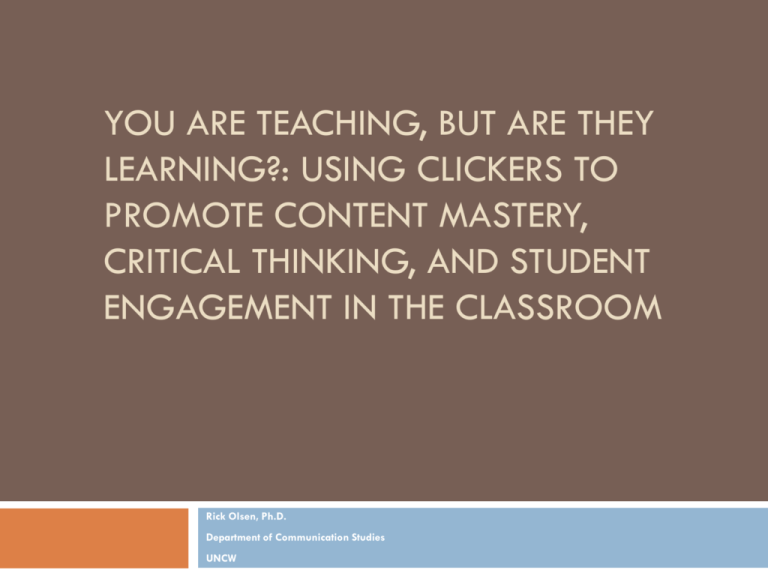
YOU ARE TEACHING, BUT ARE THEY LEARNING?: USING CLICKERS TO PROMOTE CONTENT MASTERY, CRITICAL THINKING, AND STUDENT ENGAGEMENT IN THE CLASSROOM Rick Olsen, Ph.D. Department of Communication Studies UNCW My Instructional Context Large class (120) Dense material (Research Methods) High Stress (Gateway class for the major) High workload Methods Group work IRB certification Department chair My Frustrations and Challenges Many students don’t read Many students don’t use textbook resources Many students don’t actively engage in class lecture even with “active lecture strategies” I can’t hand grade 120 daily quizzes I can’t perception check 120 students just from nonverbal cues What are some of your challenges? How I use TurningPoint to meet my challenges What follows are some strategies I’ve used It’s not a comprehensive list They often use only the more basic features I’m still learning too! Strategy One Use an on-time attendance slide before class begins. It is sometimes a silly question from “Worst Case Scenario” More often I have a review question about a previous lecture or a detail on an upcoming assignment such as number of sources required or page length Make it a “quiz question” which means there are points assigned to answering it. Rick uses the on-time slide to do which of the following? 1. 2. 3. 4. Provide a silly icebreaker Review course content Review assignment requirements All of the above 25% 25% 25% 25% 20 0 of 5 Provide a silly i... Review course con... Review assignment... All of the above Strategy Two Quizzes on textbook reading Some questions come from exam test bank Others come from textbook website Students are told that some questions will come directly from the website as an encouragement to visit that website and take the quizzes and perhaps utilize other resources Qualitative research: 0 of 5 sf or Ai m iso in d st e re nt e Is i ob je tin la ly al ric em pi ct ivi ty g. .. se d ba .. . d an Is no t fo rm st he 4. ve 3. 25% 25% 25% 25% se r 2. Preserves the form and content of human interaction Is not empirically based Is interested in isolating one aspect of the communication phenomenon to study Aims for objectivity Pr e 1. 20 Strategy Three Lecture comprehension and application My basic thought process is to have a question that is similar to this, “So if what we’ve said so far is true then what would the answer be in this situation?” Interview Questions: Thematic Experience/Behavior Opinion/Value What do you think should have happened? Feelings What would I see you doing? How did that make you feel? What’s the difference? Opinions are cognitive Feelings are emotional Interview Questions: Thematic Local Knowledge Sensory Questions How do you know when someone is trying to steal? What did your mom actually say to you? Background “Assume your boss asks you to dinner and the invitation seems to have romantic or sexual implications. How would you respond?” Is an example of 0% 0% B e g lK n o eh w le d av io va lu r o n ca io L o in p 0% ra l es 0% so ry 4. O 3. en 2. Sensory Opinion or values Behavioral Local Knowledge S 1. 20 0 of 5 Strategy Four Worksheets on Chapters and Journal Articles The instructor materials have some good application exercises, for each chapter, that work well to foster active reading and reflection. These questions are “open book” to simply reward students for doing the work. Example of worksheet. The same is true for journal articles that are assigned to the whole class so we can learn how to read academic journal articles. Question 4 A is likely what violation? 1. 2. 3. 4. Social risk Knowledge Slang None of the above 0% 38% 25% 38% 20 Social risk Knowledge Slang None of the above Why is that question so vague? If I put the entire question on the slide it doesn’t reward folks who did the worksheet. Bloom’s Taxonomy Strategy Five Invert the Taxonomy: Goal in work sheets is to have them do higher order thinking that can result in a TurningPoint question. Strategy Six Have students create questions as an exam review exercise. Then sift through them and create a short review set of slides for the next class. I try to pick “good questions” with the occasional oddball question. It does help me to see what the students thought was important I have different pairs of students pull questions from different chapters Miscellaneous Tips and Choices The quizzes are BOTH pedagogy and assessment, so I am not hard core about minimal side chatter. The exams will fix the slackers. I do have some humorous slides throughout the semester to remind people to do their own work and give advice to those being taken advantage of. Miscellaneous Tips and Choices I award one point for any answer and two points for the correct answer. This helps with motivation and attention. Most of the end of year comments about the response pads have been positive since I’ve made this change. Miscellaneous Tips and Choices Because ANY answer will get them one point, a zero is interpreted as an absence. However, there are excused absences, clicker problems, “clicker in other purse” problems and such. To code such things I have a legend for my gradebook for scores I modify or add: .5 is a clicker problem that merits “grace” on my part .7 is official university travel for athletes, etc. I typically assign them class average with a .7 rather than having them take the quiz. .6 is medical or other situation that warrants a replacement score. Miscellaneous Tips and Choices I typically read the question out loud as my low tech attempt to address ADA and LD issues. Then start the countdown. Miscellaneous Tips and Choices Silly response options are good for “on-time” questions and lightening the mood in class. Which is the example of better writing for a possible term paper? Example A: “This paper examines several definitions of interpersonal communication and compares and contrasts them on key aspects.” Example B: “After comparing and contrasting the major definitions of interpersonal communication I argue that Woods (1998) offers the most useful definition for improving interpersonal communication.” Which example is better? 1. 2. 3. Example A is better Example B is better I didn’t realize this would be a quiz question so I played FarmVille. My group already wants to kick me out . . . Miscellaneous Tips and Choices Work out your defaults carefully to save time in slide construction: timer, response indicator, point value and others can be part of every slide. Workshop Work by yourself or with 1 or 2 others Identify questions you have at this point Discuss and create some slides or strategies that you think will actually work for YOUR instructional context and challenges Identify questions you have that may need to be answered for you to pull of the strategy(ies) you’ve identified REMEMBER This is EVOLUTION, not REVOLUTION Your goal is to pick 1 or 2 KEY strategies that keep you from being the hardest working person in the classroom and shift some of that responsibility to the students Key Thought for the Workshop The key to learning is not “feed” but “feedback” Both students and teachers are wondering—or should be wondering—“How am I doing?” Use the SRS technology to help answer that question for BOTH of you! Workshop Work by yourself or with 1 or 2 others Identify questions you have at this point Discuss and create some slides or strategies that you think will actually work for YOUR instructional context and challenges Identify questions you have that may need to be answered for you to pull of the strategy(ies) you’ve identified Share and Q/A
